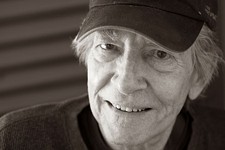Journalist George Crile on His 'Charlie Wilson's War'
Journalist George Crile believes that "something about Texas and its oil heritage seems to permit its citizens to reinvent their histories and to carry out their lives as if they were part of an ongoing theatrical experience." So, how does this relate to legendary Lufkin Congressman Charlie Wilson, the CIA, and Afghanistan?
By Clay Smith, Fri., June 27, 2003

Not long after George Crile began reporting on the CIA in the Seventies, he learned a valuable secret about one of the world's most elusive institutions (even though it was a secret hiding in plain sight): If you happened to be covering a covert CIA war and stuck with the story for a while, you could eventually know more about that war than any of the CIA people actually running it. "They're all in and out in short tours," Crile, who was an editor at Harper's in the Seventies and who is now a producer at 60 Minutes II, says. "In any given tour," Crile points out, "some people know what happened, but only a few people."
But even an experienced CIA-hound like Crile had to pinch himself when he came across the strange tale he smartly conveys in Charlie Wilson's War: The Extraordinary Story of the Largest Covert Operation in History (Atlantic Monthly, $26). Crile estimates that he spent a total of 14 years working on the story of the CIA's covert war in Afghanistan, which started after Soviet troops invaded the country over Christmas of 1979. It was a time when Afghans were regarded as noble victims -- underdog freedom fighters struggling against merciless Communists -- and Congress poured hundreds of millions of dollars throughout the Eighties to fund the Afghans, who forced Soviet troops to withdraw. Then the U.S. left Afghanistan a war-scarred country and a vacuum for Muslim fundamentalists. "What had struck me as a missing chapter demeaning the role of the Afghan war in helping to trigger the collapse of the Soviet empire," Crile says, "suddenly expanded into a second missing chapter about how we not only lost, mysteriously, one foe that seemed to be omnipotent but why equally as abruptly we found ourselves with a brand-new global enemy seemingly able to strike at will."

Crile says that one reason Americans felt so helpless after the September 11 attacks was the lack of knowledge about the "size or scope or significance" of the CIA's Afghan war, whose victorious outcome the Afghans interpreted as their greatest modern jihad. "And obviously," Crile says, "if anyone were to propose today that we should go off and arm a half-million Muslim fundamentalists and turn 150,000 of them into techno-holy-warriors and give them satellite-guided devices, stingers, and all kinds of exploding devices and training in the dark arts of urban terror, I think people might feel that that was a bad idea."
At the center of Crile's absorbing book is a swaggering, scandal-prone former Democratic congressman from Lufkin who "promoted his vices and hid his virtues," who The New York Times discounted as recently as 1996 as "the biggest party animal in Congress." But Wilson knew what he was doing all along: While reporters were eager to disclose his frequent womanizing and his purported allegiance to cocaine, the tall Texan with Marlboro Man good looks and the booming voice who had his own "personal belly dancer" became one of the most effective backroom operators since LBJ and maneuvered himself onto the powerful Appropriations Committee, where he not only sent needed money back to East Texas, but also to the CIA.
Crile scoots beyond Charlie Wilson, however, and fingers the Texans who transformed him into a virulent anti-Communist hawk. Chief among them was Joanne Herring, a charming Houston socialite who "saw potential for greatness in the most unlikely characters," Crile writes, and had been inducted as a young debutante into the Minutewomen, an offshoot of the ultraright Minutemen organization. "I decided back then that I would dedicate my life to making the free-enterprise society survive for my children," Herring told Crile, but by the Seventies, she also seemed quite busy hosting decadent Roman toga parties and her own Houston talk show.
Crile still can't quite believe the story he uncovered. When he learned about Joanne Herring, he recalls wondering, "Could this really be the motivating force for the end of the Evil Empire?" But in the midst of Crile's important exposé of U.S. covert policy in Afghanistan and its ramifications, there's an engrossing character study as well. "Something about Texas and its oil heritage," he writes, "seems to permit its citizens to reinvent their histories and to carry out their lives as if they were part of an ongoing theatrical experience."








